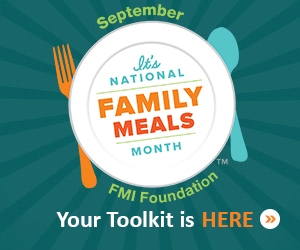By: David Fikes, Executive Director, FMI Foundation

One of the last conversations I had with my older brother before he died last April was about our mutual love of Thanksgiving. We reminisced about favorite dishes, how we relished eating cranberry sauce in front of our other brother because he was allergic to it and times when Mom’s ventures into the forbidden territory of new recipes got voted down—outnumbered by three opinionated sons and a very tradition-loving, culinary unadventurous husband. As my brother and I chatted, we concurred that as holidays go, we found Thanksgiving customs to be relatively and refreshingly straight forward; sit down to a terrific meal comprised of favorite foods, surrounded by people you love and be grateful. He and I agreed that our world needs more of that; a time to pause, connect around our common need of sustenance and pay homage to the many ways our lives have been blessed. In retrospect, his words have greater power because at that time he had much he could be angry, frustrated, and sad about – failing health, diminished mobility, and not much hope of things getting better. Still, he yearned for the encouragement that the queen mother of family meals—Thanksgiving—offers in helping us stay focused on the positive and be grateful for what he had, rather than bitter about what he was losing. He was not alone in recognizing the transformative power of the family meal.
The Harris Poll results that measure the reach of FMI Foundation’s National Family Meals Month™ messaging each September confirm that many share my brother’s opinion about the positive value of meals shared together. Some 86% of the population indicated they thought it was important for families to have as many family meals together as possible each week. A whopping 79% said they were willing to commit to having more family meals each week. Clearly the benefits of family meals are recognized and the desire to have them is there, but many (57%) also shared they could use some help making it easier to have more meals together.
Almost one-third of Americans saw our National Family Meals Month messaging either in store, through social media, on package, in print or on television. Of those who saw it, nine out ten reported that the messaging impacted how they shopped or what they ate. The stats are even stronger among households with kids under 17 years old. Over half the U.S. population in that category saw our promotions and almost all reported it made a difference in what they shopped for and prepared for their families.
Other family meal statistics that saw some growth this year include: a 5% jump in those who are cooking more meals at home, 7% more indicating they are making healthier choices, a 5% increase in those who doing more meal advance planning and a 7% rise in those using new recipes. (My Mother would be so proud!) Overall, shoppers continued to respond positively to being encouraged to have more family meals, saying it was a good concept and informative. From everyone involved and supporting family meals, consumers requested we provide even more actionable ideas to help them act on their desire.
In a time when the challenges we face make it easy to get critical and cynically focused on what is not happening in accord with our wishes, we all need the grounding that family meals offer. We may gather to nourish and replenish our bodies, but as we share our days, discussing our highs and lows, we find that our hearts and souls are nourished and replenished as well. We all seem to intuitively know that we just need the encouragement to make that family meal happen, so it can do its marvelous work of helping us be the best version of ourselves.
I hope you and yours have glorious Thanksgiving, which is, after all, a super version of the family meal.


